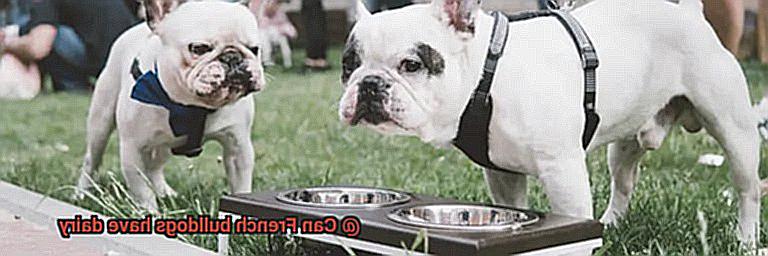Can French bulldogs have dairy?
Are you the proud owner of a French bulldog?
Contents
- 1 What is Lactose Intolerance in Dogs?
- 2 Symptoms of Lactose Intolerance in French Bulldogs
- 3 Not All French Bulldogs Are Lactose Intolerant
- 4 Best Practices When Introducing Dairy to a French Bulldog’s Diet
- 5 Non-Dairy Alternatives for French Bulldogs
- 6 Nutritional Benefits of Non-Dairy Options for French Bulldogs
- 7 Consulting With Your Veterinarian Before Changing Your Dog’s Diet
- 8 Conclusion
If so, you know that these little bundles of joy come with their own set of dietary considerations. While we humans have an abundance of food choices, it’s important to be mindful of what our furry friends can and cannot eat.
One burning question many French bulldog owners have is whether or not they can indulge in dairy. We’ve all experienced those adorable puppy eyes begging for a taste of our ice cream or cheeseburger.
But is it safe? In this blog post, we’ll take a deep dive into this intriguing topic, exploring the potential risks and benefits of including dairy in your French bulldog’s diet.
So grab a cup of tea (or milk) and join us on this informative journey.
What is Lactose Intolerance in Dogs?
One aspect of their well-being that you should pay attention to is their digestive health. One common issue that can affect French Bulldogs, as well as other breeds, is lactose intolerance. In this blog post, we will explore what lactose intolerance is, how it affects French Bulldogs, and what you can do to manage it.
What is Lactose Intolerance?
Lactose intolerance in dogs refers to the inability to properly digest lactose, a sugar found in milk and other dairy products. This occurs due to the lack of an enzyme called lactase, which breaks down lactose into simpler forms for digestion. Without enough lactase, lactose remains undigested in the digestive system, causing gastrointestinal issues.
Signs and Symptoms:
French Bulldogs with lactose intolerance may show various symptoms after consuming dairy products. These can include diarrhea, flatulence, bloating, abdominal pain, and even vomiting. If you notice any of these signs in your Frenchie after they consume dairy, it’s time to consider lactose intolerance as the culprit.
Managing Lactose Intolerance:
- Understand Your Frenchie’s Tolerance Level: Not all French Bulldogs are lactose intolerant. Some may be able to tolerate small amounts of dairy without issues. However, it’s always best to introduce dairy into their diet slowly and monitor their reaction.
- Avoid Dairy Products: If you suspect your French Bulldog has lactose intolerance, it’s advisable to avoid giving them dairy products altogether. Fortunately, there are plenty of alternative options available that can provide similar nutritional benefits without the risk of digestive upset.
- Opt for Lactose-Free Alternatives: Many pet stores offer lactose-free or low-lactose dairy products specifically formulated for dogs. These products have the lactose content removed or reduced while still providing the essential nutrients found in dairy.
- Non-Dairy Alternatives: There are several non-dairy alternatives that can be included in your Frenchie’s diet to ensure they receive necessary nutrients. Opt for lactose-free milk specifically formulated for dogs, as well as dairy-free yogurt or cheese made from plant-based ingredients.
- Consult with a Veterinarian: Before making any significant changes to your French Bulldog’s diet, it’s crucial to consult with a veterinarian. They can provide specific recommendations based on your Frenchie’s individual needs and health condition.
Symptoms of Lactose Intolerance in French Bulldogs
French Bulldogs are beloved pets known for their affectionate nature and distinctive appearance. However, just like humans, they can also experience lactose intolerance. In this blog post, we will explore the symptoms of lactose intolerance in French Bulldogs and how to manage their condition effectively.
Symptoms of Lactose Intolerance in French Bulldogs:
Lactose intolerance occurs when dogs lack the enzyme lactase, which is necessary to digest lactose, the sugar found in milk and dairy products. Here are some common symptoms that may indicate lactose intolerance in French Bulldogs:
- Diarrhea: Loose stools or frequent bowel movements may occur within a few hours after consuming dairy products.
- Gas and Bloating: Excessive gas and bloating can cause discomfort and abdominal distention.
- Vomiting: French Bulldogs with lactose intolerance may vomit after ingesting dairy, as their digestive system struggles to break down lactose.
- Stomach Discomfort: Dogs may show signs of discomfort such as restlessness, pacing, or abdomen tenderness.
Managing Lactose Intolerance in French Bulldogs:
To ensure your French Bulldog’s well-being, it is important to take steps to manage their lactose intolerance. Here are some strategies you can implement:
- Recognize the Signs: Pay attention to any digestive issues your French Bulldog may experience after consuming dairy products. Keeping a diary can help identify patterns and specific triggers.
- Eliminate Dairy Products: Avoid feeding your French Bulldog any dairy products, including milk, cheese, yogurt, or ice cream. Opt for lactose-free alternatives instead.
- Consult with a Veterinarian: If your French Bulldog accidentally consumes dairy and experiences symptoms, it is best to seek professional guidance. A veterinarian can provide advice and potential treatment options.
- Consider Lactase Supplements: In some cases, veterinarians may recommend lactase supplements, which can help break down lactose and alleviate symptoms. Always consult with a veterinarian before introducing any supplements.
- Provide Suitable Alternatives: Ensure your French Bulldog’s diet is balanced and nutritious by offering lactose-free alternatives such as coconut or almond milk specifically formulated for dogs.

Not All French Bulldogs Are Lactose Intolerant
Contrary to popular belief, not all French Bulldogs are lactose intolerant. While it is true that lactose intolerance is a common issue among dogs, including French Bulldogs, the severity and prevalence of this condition can vary from one individual to another.
In this article, we will explore why not all French Bulldogs are lactose intolerant and provide insights based on first-hand knowledge and experiences.
Understanding Lactose Intolerance in French Bulldogs
Lactose intolerance is the inability to digest lactose, which is the sugar found in milk and dairy products. This occurs when the body does not produce enough of the enzyme called lactase, which is needed to break down lactose. However, French Bulldogs, like other dog breeds, are born with the ability to produce lactase and digest their mother’s milk.
A Gradual Decrease in Lactase Production
As French Bulldog puppies grow older, their bodies naturally start producing less lactase. This decrease in lactase production happens in varying degrees among individual dogs and breeds.
Some French Bulldogs may continue to produce enough lactase to digest small amounts of dairy products without any issues. They might enjoy an occasional lick of ice cream or a small piece of cheese without experiencing any digestive problems.
Individual Tolerance Levels May Vary
On the other hand, some French Bulldogs may experience mild symptoms of lactose intolerance when consuming larger amounts of dairy. These symptoms can include gas or diarrhea. It’s important for owners to monitor their furry friend’s reactions to dairy products and adjust their diet accordingly.
Consulting a Veterinarian
In more severe cases, French Bulldogs may exhibit pronounced symptoms such as vomiting or abdominal pain when consuming any amount of dairy. If you notice these symptoms in your pet, it is crucial to consult with a veterinarian for proper diagnosis and guidance.
Managing Lactose Intolerance in French Bulldogs
If your French Bulldog is lactose intolerant, there are several ways to manage their condition and ensure their well-being. Consider the following tips:
- Opt for lactose-free or dairy-free alternatives: There are many lactose-free or dairy-free options available in pet stores and online. These products are formulated specifically for dogs with lactose intolerance and can provide a safe and tasty alternative.
- Gradually introduce new foods: When introducing new foods into your French Bulldog’s diet, it is important to do so gradually. This allows their digestive system to adjust and reduces the risk of digestive upset.
- Monitor your dog’s diet: Keep track of what your French Bulldog eats and how they react to different foods. This will help you identify any triggers or potential sensitivities.
- Seek professional advice: If you are unsure about what foods are safe for your French Bulldog, it is always best to consult with a veterinarian. They can provide tailored advice based on your dog’s individual needs.
Best Practices When Introducing Dairy to a French Bulldog’s Diet
French Bulldogs and dairy have a complicated relationship. While not all French Bulldogs are lactose intolerant, their ability to digest dairy can vary from dog to dog. If you’re considering adding dairy to your French Bulldog’s diet, it’s essential to do so gradually and in small quantities. Here are some best practices to follow:
- Start with Small Quantities: Begin by offering a small amount of plain, unsweetened yogurt or cottage cheese as a treat. This will help you gauge your French Bulldog’s tolerance for dairy.
- Monitor Your Dog’s Response: Keep a close eye on your dog for any signs of discomfort or digestive issues, such as diarrhea or vomiting. If you notice any adverse reactions, it’s best to discontinue giving dairy and consult with your veterinarian.
- Increase Quantity Slowly: If your French Bulldog tolerates the small amount of dairy well, you can gradually increase the quantity over time. This will allow their digestive system to adjust slowly.
- Consider Lactose Intolerance: It’s important to note that some French Bulldogs may be lactose intolerant. If your dog shows signs of lactose intolerance, such as gas or bloating, it’s best to avoid dairy altogether and explore alternative sources of calcium and nutrients.
- Consult with Your Veterinarian: Before introducing dairy into your French Bulldog’s diet, especially if your dog has any pre-existing health conditions or dietary restrictions, consult with your veterinarian. They can provide personalized guidance based on your dog’s specific needs.
- Choose High-Quality Products: Always choose high-quality, organic dairy products without any added sugars or artificial ingredients. This ensures that you’re offering the best possible options for your furry friend.
- Avoid Chocolate: It’s crucial to avoid giving your French Bulldog any dairy products that contain chocolate, as chocolate is toxic to dogs. Stick to plain, unsweetened options.
Remember, dairy should never be the main component of your French Bulldog’s diet and should only be given in moderation as an occasional treat. It’s always best to consult with your veterinarian before making any significant changes to your dog’s diet.
Non-Dairy Alternatives for French Bulldogs
French Bulldogs are beloved pets known for their playful nature and charming personalities. However, these adorable pups can sometimes have trouble digesting dairy products due to lactose intolerance.
There are plenty of non-dairy alternatives available that can provide all the nutrition your furry friend needs without the tummy troubles. In this article, we’ll explore the top non-dairy alternatives for French Bulldogs and how to introduce them gradually for a smooth transition.
Almond Milk:
Made from ground almonds and water, almond milk is a popular choice for French Bulldogs. It’s packed with calcium, vitamin E, and healthy fats that promote overall well-being. Just be sure to choose unsweetened almond milk to avoid any added sugars or artificial sweeteners that could harm your pup.
Coconut Milk:
Derived from the flesh of coconuts, coconut milk is naturally lactose-free and offers essential nutrients like potassium and medium-chain triglycerides (MCTs). These MCTs support a healthy coat and skin for your French Bulldog, keeping them looking fabulous.
Soy Milk:
Soy milk, made from soybeans, is another fantastic non-dairy alternative for French Bulldogs. It’s a great source of protein and provides essential amino acids for muscle growth and repair. Opt for unsweetened and organic soy milk to ensure it’s free from potential allergens or harmful additives.
Oat Milk:
If you’re looking for a nutrient-rich option, consider oat milk. Made by blending soaked oats with water, oat milk is high in fiber, vitamins, and minerals like iron and calcium. Ensure you choose plain oat milk without added sugars or flavorings to keep it safe for your pup.
Introducing Non-Dairy Alternatives:
When introducing any new non-dairy alternative to your French Bulldog’s diet, take it slow and steady. Start by offering a small amount and monitor their reaction for any signs of digestive upset or allergies. If all goes well, gradually increase the amount over time. Remember, each dog is unique, so it’s essential to pay attention to your pup’s individual needs.
Consulting with a professional:
While non-dairy alternatives can provide great nutrition, they should not replace a balanced diet for your French Bulldog. It’s always a good idea to consult with your veterinarian or a canine nutritionist to ensure your furry friend’s dietary needs are met. They can help determine which non-dairy alternative is best suited for your pup’s specific requirements.
Nutritional Benefits of Non-Dairy Options for French Bulldogs
French Bulldogs are adorable little companions, but like many other dog breeds, they can struggle with digesting dairy products. Lactose intolerance is a common issue for French Bulldogs, as they lack the enzyme lactase needed to properly break down lactose, the sugar found in dairy.
This can lead to uncomfortable digestive issues like diarrhea, gas, and bloating. So, what are the alternatives? Let’s explore the nutritional benefits of non-dairy options for our furry friends.
Almond Milk: A Low-Calorie Delight
Almond milk is a popular non-dairy option that packs a nutritional punch. It is low in calories and fat, making it a great choice for French Bulldogs who need to watch their waistlines. Almond milk contains vitamin E, calcium, and potassium, providing essential nutrients for your pup. Just be sure to choose unsweetened almond milk to avoid any added sugars that could be harmful to your furry friend.
Oat Milk: A Digestive Aid
If your French Bulldog has a sensitive stomach or allergies, oat milk may be the perfect non-dairy option. It is rich in fiber, which can aid in digestion and promote a healthy gut. Oat milk also contains vitamins like B12 and minerals like iron, ensuring your pup gets the nutrients they need.
Coconut Milk: Creamy and Flavorful
Coconut milk is not only creamy and delicious but also offers some unique health benefits for French Bulldogs. It contains medium-chain fatty acids (MCFAs), which can provide a quick source of energy for your pup. Additionally, coconut milk is high in lauric acid, which has antibacterial and antiviral properties.
It’s important to remember that while non-dairy alternatives can provide some nutritional benefits for French Bulldogs, they should not replace a balanced diet consisting of high-quality dog food formulated specifically for their breed and age. Non-dairy options can be a great addition to their diet, but they should not be the sole source of nutrition.
When introducing non-dairy options to your French Bulldog’s diet, it’s always wise to do so gradually and monitor their reaction. Some dogs may have allergies or sensitivities to certain ingredients in non-dairy products. Consulting with a veterinarian before making any dietary changes is highly recommended.
Consulting With Your Veterinarian Before Changing Your Dog’s Diet
Providing them with a nutritious and balanced diet is key to their overall health and well-being. However, before making any changes to their diet, it is important to consult with your veterinarian. In this article, we will explore why this step is crucial and how it can benefit your furry friend.
Expert Guidance Tailored to Your French Bulldog’s Needs:
Your veterinarian is the ultimate authority when it comes to your French Bulldog’s health. They will consider important factors like age, breed, weight, and any existing health conditions before recommending dietary changes. This personalized approach ensures that the new diet will cater to your dog’s specific needs.
Avoiding Health Issues:
Making dietary changes without professional guidance can lead to potential health issues for your French Bulldog. For example, introducing new foods without knowing about any allergies or sensitivities can result in digestive upset. Your veterinarian can provide insights on food allergies and sensitivities and help you avoid these unnecessary troubles.
Maintaining Nutritional Balance:
A sudden change in diet can disrupt the delicate balance of nutrients your French Bulldog needs. This imbalance can lead to deficiencies or excesses of certain vitamins and minerals, impacting their overall health. By consulting with your veterinarian, you can ensure that your dog receives a properly balanced diet that meets their nutritional requirements.
Expert Recommendations:
Your veterinarian has extensive knowledge about various dog food brands and types of diets available in the market. They can recommend specific brands or types of food that are suitable for your French Bulldog’s individual needs. Whether it’s a balanced commercial dog food or a homemade diet, their expertise will guide you in selecting the best option.
Regular Check-ups for Optimal Health:
Regular check-ups with your veterinarian are essential to monitor your French Bulldog’s health and make any necessary adjustments to their diet. As your dog ages or if they develop any health conditions, their dietary requirements may change. Regular consultations ensure that you stay up-to-date with their evolving needs.
Em5WE9QFfa0″ >
Conclusion
In conclusion, it is best to avoid feeding dairy products to French bulldogs.
While some may argue that small amounts of certain dairy products can be tolerated, it is important to consider the potential risks and health issues that can arise. French bulldogs have a higher likelihood of lactose intolerance, which can lead to digestive upset and discomfort.
Therefore, it is recommended to stick with a balanced diet specifically formulated for French bulldogs, ensuring their well-being and happiness.




